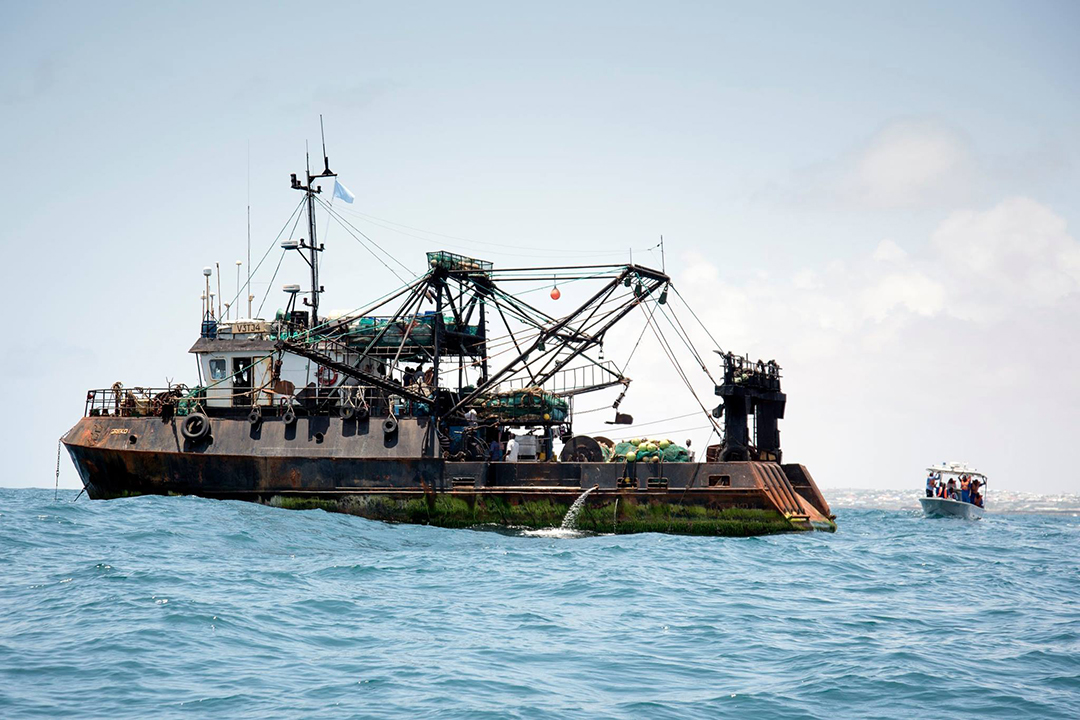Research Shows Importance of Cooperation in Illegal Fishing Fight
ADF STAFF
.”
Cooperation is key in addressing illegal fishing since “no one has the resources by themselves, particularly developing countries, to address it from a capability and capacity standpoint,” Dan Schaeffer, who leads Pew’s work on international fisheries and maritime security, told ADF.
The Pew report highlighted the work of FISH-i Africa, a partnership of eight countries — Comoros, Kenya, Madagascar, Mauritius, Mozambique, Seychelles, Somalia and Tanzania —that brings together national enforcement authorities, regional organizations and international technical and legal experts to combat IUU fishing in the western Indian Ocean.
“They all agree to work together; it’s more of an informal thing,” Schaeffer said of FISH-I Africa.
But it’s been effective. Through information sharing and regional coordination, FISH-i Africa has interdicted illegal fishing operations and prevented illegal fishing operators from using regional ports.
Schaeffer recounted one of FISH-i’s first success stories, which began in 2012 when a South Korean-flagged vessel called the Premier was caught fishing illegally in Liberia.
Following talks between Liberian and South Korean authorities — and media coverage of the vessel’s activities — the Premier left for the western Indian Ocean.
East African nations were aware of the vessel’s history before it arrived, thanks to information sharing among participating FISH-i states.
Between January and March 2013, Kenya and Mozambique denied the Premier fishing licenses. Officials discovered a forged letter onboard the vessel purportedly from Liberian authorities absolving the vessel of any wrongdoing, according to Stop Illegal Fishing, the Botswana-based nonprofit organization that formed FISH-i.
Other countries soon followed Kenya and Mozambique’s actions. Comoros stated that it would deny the Premier a fishing license, Mauritius and Seychelles denied the vessel permission to offload its catch in their ports, and Tanzania refused to renew its fishing license. In April 2013, the Premier’s owners paid the Liberian government $1 million in fines.
By December 2013, the vessel was renamed Adria. It was refitted and upgraded to comply with regulations and returned to Seychelles. It remained under scrutiny of FISH-i countries until at least 2017 and there were no further reports of suspected illegal activity, according to Stop Illegal Fishing.
The Pew report also outlined the potential benefits of the Cape Town Agreement. Adopted in 2012 by the International Maritime Organization, the agreement is expected to be implemented this year. It outlines fishing vessel standards and includes regulations designed to protect fishing crews and fisheries observers. There are currently no mandatory global safety regulations for fishing vessels.
That has been a problem in West Africa, which attracts 40% of the world’s illegal trawlers. According to a study by the Stanford University Center for Ocean Solutions, West Africa is one of the world’s hot spots for labor abuse on vessels involved in illegal fishing.
The region is also the world’s epicenter for illegal fishing, which is mostly perpetrated by Chinese fishing vessels. West Africa loses an estimated $2.3 billion to $9.4 billion annually to IUU fishing. The continent loses $11.5 billion annually to illegal fishing, according to the Financial Transparency Coalition.
The Pew report argues that regional coordination can help countries counter specific illegal activities, such as transshipment, the practice of transferring fish from a fishing vessel to a refrigerated cargo ship. Also known as “saiko,” the practice allows vessels to avoid catch limits.
The practice robbed Ghana alone of 100,000 tons of fish in 2017, according to the Environmental Justice Foundation.
Ultimately, every government has its own responsibilities and plans to end illegal fishing, but implementing them without consulting with neighboring countries limits their effectiveness, the Pew report said.
“Increasing regional cooperation and coordination is a hard but necessary step to help stamp out IUU fishing, improve ocean health, and bring benefits — including international credibility — to all States involved,” wrote the report’s authors, Katherine Hanly and Tahiana Fajardo Vargas.


Comments are closed.